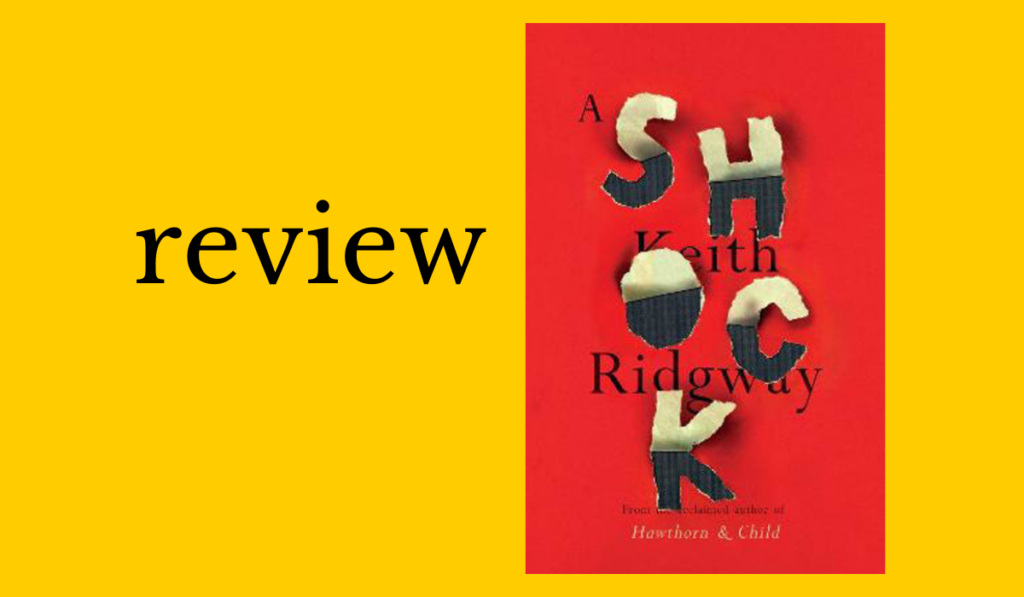
A Shock|Keith Ridgway|Picador|ISBN 9781529064803|£14.99
“This is a masterfully crafted, highly intriguing novel that delivers the shock of its title…”
by Niall McArdle
Telling a story
How to start a story, how to tell it and how to end it? Keith Ridgway’s thrilling A Shock deals with this idea, with the building blocks of stories—structure, dialogue and language—at its heart. Written as a sequence of nine interconnected stories (each simply titled: ‘The Flat, ‘The Camera’, ‘The Song’, etc.), the narrative circles back on itself: characters from one story show up or are mentioned in another, and the novel opens and closes on the same moment.
Set in London with a disparate cast of characters, the book touches on large contemporary issues: class struggle, racism, sexuality, surveillance, the difficulties in finding accommodation in an increasingly gentrified city. It practically begs for the sort of review that describes it as ‘urgent and necessary’, yet Ridgway’s sensibility hints at something older, deeper, more universal: what it is to tell – and listen to – a story.
Surveillance and paranoia
There are two recurring themes: surveillance and the paranoia it induces, and communication or lack of it. People keep an eye on each other. A widow spies on her neighbours’ party and ends up stuck in the party wall between the two houses. A builder gets locked in the house he’s working in and hides out in the attic, eavesdropping on the owner.
Often Ridgway makes it so we’re the ones snooping
In “The Flat” the narrative proceeds in a series of declarative statements detailing the mundane reality of the place, “the flat is not the same shape as theirs. He stands in a small hallway. He puts his keys on a shelf over a radiator. Everything white. Except a small round wooden table in a corner”, and the private, intimate moments of the protagonist, “David groans. He looks like he is about to come but he doesn’t. He looks at more photographs. He continues to masturbate. He spits on his hand.”
Tall Tales
The previous tenants who have disappeared have left “a sort of an energy. No, not energy. I hate that sort of talk, that language.” People often lie or simply miscommunicate. In “The Joke” a woman makes up a whole life-story to tell a colleague and when confronted with the lie, her response is ‘I just like to entertain.’ In “Pigeon” a man deliberately mispronounces ‘Tesla’ as ‘Telsa’ and says “I misspeak out of defiance.”
Though the novel is intricately woven and in the end comes full circle, there is no sense that Ridgway is parading his cleverness or showing off.
An air of melancholy often hangs in the air and yet at times it is wryly funny, especially when Ridgway displays his knack for dialogue. In “The Meeting” a Labour Party organizer attempts to recruit a new member.
Several of the stories take place in a pub, and that’s on purpose, I think: a pub is the locus, after all, of many a tall tale. The pub is called The Arms, a traditional London boozer that has yet to succumb to gentrification (although one character suggests that since the novelist Muriel Spark lived nearby, the pub should use that to attract customers. “You could relabel the toilets The Bachelors, and The Girls of Slender Means”).
Perspective
The central section – fittingly called ‘The Story’ – is a story about how we tell stories, and it alludes to elements in other parts of the novel: the story of a woman in the wall; the story of a couple who disappeared; the story of a man locked in an attic.
As in much of the novel, there are walls and dividers that separate people from each other.
A couple sit in The Arms “at the end, at the wall that divides the front bar from the back.” Their names are Yves and Anna, but they are known by other names in other chapters (this is significant: firstly, they are disliked in those other stories; secondly, the point of many of the anecdotes that they tell each other is perspective. They discuss a South American legend of a bird that died because it kept trying to fly to the sun (“its heart would burst and it would fall down, dead”), and how the Spanish conquistadors saw the parallel to the myth of Icarus, wondered if the Greeks ever made it to South America or if it simply meant that “all the world’s people came from the same original story.” Yves tells Anna that “this isn’t even the start of the story, this is all just a preamble.”
Canny Empathy
There is a canny empathy running through A Shock. This is a masterfully crafted, highly intriguing novel that delivers the shock of its title with the slow, steady build-up of anxiety and dread that often characterizes dreams.
Images reappear throughout. There are rats. There are mice. There are pipes and tunnels and corridors and thresholds, a reminder that something vaguely off is never far away. Things just feel ever so slightly off-kilter and the resulting unease is often expressed in language and silence: “Something has happened to the conversation.”












